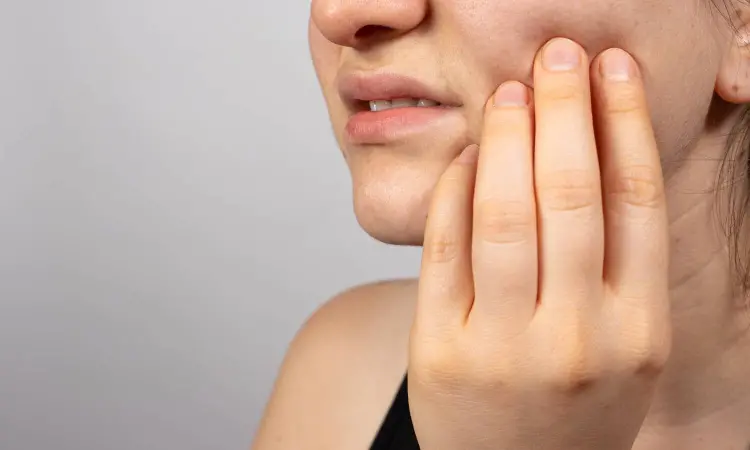- Home
- Medical news & Guidelines
- Anesthesiology
- Cardiology and CTVS
- Critical Care
- Dentistry
- Dermatology
- Diabetes and Endocrinology
- ENT
- Gastroenterology
- Medicine
- Nephrology
- Neurology
- Obstretics-Gynaecology
- Oncology
- Ophthalmology
- Orthopaedics
- Pediatrics-Neonatology
- Psychiatry
- Pulmonology
- Radiology
- Surgery
- Urology
- Laboratory Medicine
- Diet
- Nursing
- Paramedical
- Physiotherapy
- Health news
- Fact Check
- Bone Health Fact Check
- Brain Health Fact Check
- Cancer Related Fact Check
- Child Care Fact Check
- Dental and oral health fact check
- Diabetes and metabolic health fact check
- Diet and Nutrition Fact Check
- Eye and ENT Care Fact Check
- Fitness fact check
- Gut health fact check
- Heart health fact check
- Kidney health fact check
- Medical education fact check
- Men's health fact check
- Respiratory fact check
- Skin and hair care fact check
- Vaccine and Immunization fact check
- Women's health fact check
- AYUSH
- State News
- Andaman and Nicobar Islands
- Andhra Pradesh
- Arunachal Pradesh
- Assam
- Bihar
- Chandigarh
- Chattisgarh
- Dadra and Nagar Haveli
- Daman and Diu
- Delhi
- Goa
- Gujarat
- Haryana
- Himachal Pradesh
- Jammu & Kashmir
- Jharkhand
- Karnataka
- Kerala
- Ladakh
- Lakshadweep
- Madhya Pradesh
- Maharashtra
- Manipur
- Meghalaya
- Mizoram
- Nagaland
- Odisha
- Puducherry
- Punjab
- Rajasthan
- Sikkim
- Tamil Nadu
- Telangana
- Tripura
- Uttar Pradesh
- Uttrakhand
- West Bengal
- Medical Education
- Industry
Titanium Brushes Non-Inferior to Implantoplasty in surgical treatment of peri implantitis: Study

A new study published in the Journal of Clinical Periodontology showed that titanium that rotates In the surgical treatment of peri-implantitis, brushes are not less effective than implantoplasty.
An inflammatory disorder called peri-implantitis affects the tissues around dental implants, which can cause increasing bone loss and even implant failure. To encourage re-osseointegration and avoid recurrence, effective surface cleaning is essential in its surgical therapy. The ability of implantoplasty and rotating titanium brushes to mechanically remove biofilm and smooth contaminated implant surfaces has drawn interest among other treatments.
While titanium brushes are made to debride implant threads while maintaining their morphology, implantoplasty entails mechanically altering and polishing the exposed implant surface to lessen surface roughness and bacterial adherence. Although both approaches seek to improve the microbiological and clinical results of peri-implantitis surgery, they vary in terms of clinical effectiveness, invasiveness, and impact on implant integrity. Thus, this study assessed the results of treatment after implantoplasty or the use of rotating titanium brushes in the surgical management of peri-implantitis.
This 12-month randomized clinical study with a non-inferiority setup included 30 patients with peri-implantitis who required surgery. Implantoplasty (control group) or titanium brushes (test group) were used for surface cleansing. In addition to patient-reported outcomes (Oral Health Impact Profile-14; OHIP-14), clinical and radiographic indicators were assessed.
At 12 months, 6/15 implants in the test group and 4/15 in the control group had the composite result. As evidence of the test procedure's non-inferiority, probing pocket depth (PPD) values dropped by 3.6 ± 1.5 mm (test) and 3.3 ± 1.2 mm (control). The bone levels of the test group stayed the same (0.0 ± 0.6 mm), however the control group saw more bone loss (0.7 ± 1.2 mm).
Relevant predictors for pocket closure were baseline PPD (p = 0.044) and the existence of a neighboring implant with peri-implantitis (p = 0.033). The test's surface decontamination time (3 min 1 s) was substantially less than that of the control group (5 min 27 s) (p = 0.006). The results of the OHIP-14 were statistically indifferent.
Overall, when compared to implantoplasty, the use of a revolving titanium brush in surgical treatment for peri-implantitis produces non-inferior results. Utilizing the titanium brush was linked to shorter treatment times and improved preservation of peri-implant MBLs.
Source:
Park, S.-H., Kim, D.-B., Kim, D.-M., Sanz-Martin, I., Sanz-Sanchez, I., Derks, J., & Cha, J.-K. (2025). Implantoplasty vs. Rotating titanium brushes in the surgical treatment of Peri-implantitis: A 1-year randomised controlled clinical trial. Journal of Clinical Periodontology. https://doi.org/10.1111/jcpe.70056
Neuroscience Masters graduate
Jacinthlyn Sylvia, a Neuroscience Master's graduate from Chennai has worked extensively in deciphering the neurobiology of cognition and motor control in aging. She also has spread-out exposure to Neurosurgery from her Bachelor’s. She is currently involved in active Neuro-Oncology research. She is an upcoming neuroscientist with a fiery passion for writing. Her news cover at Medical Dialogues feature recent discoveries and updates from the healthcare and biomedical research fields. She can be reached at editorial@medicaldialogues.in
Dr Kamal Kant Kohli-MBBS, DTCD- a chest specialist with more than 30 years of practice and a flair for writing clinical articles, Dr Kamal Kant Kohli joined Medical Dialogues as a Chief Editor of Medical News. Besides writing articles, as an editor, he proofreads and verifies all the medical content published on Medical Dialogues including those coming from journals, studies,medical conferences,guidelines etc. Email: drkohli@medicaldialogues.in. Contact no. 011-43720751


